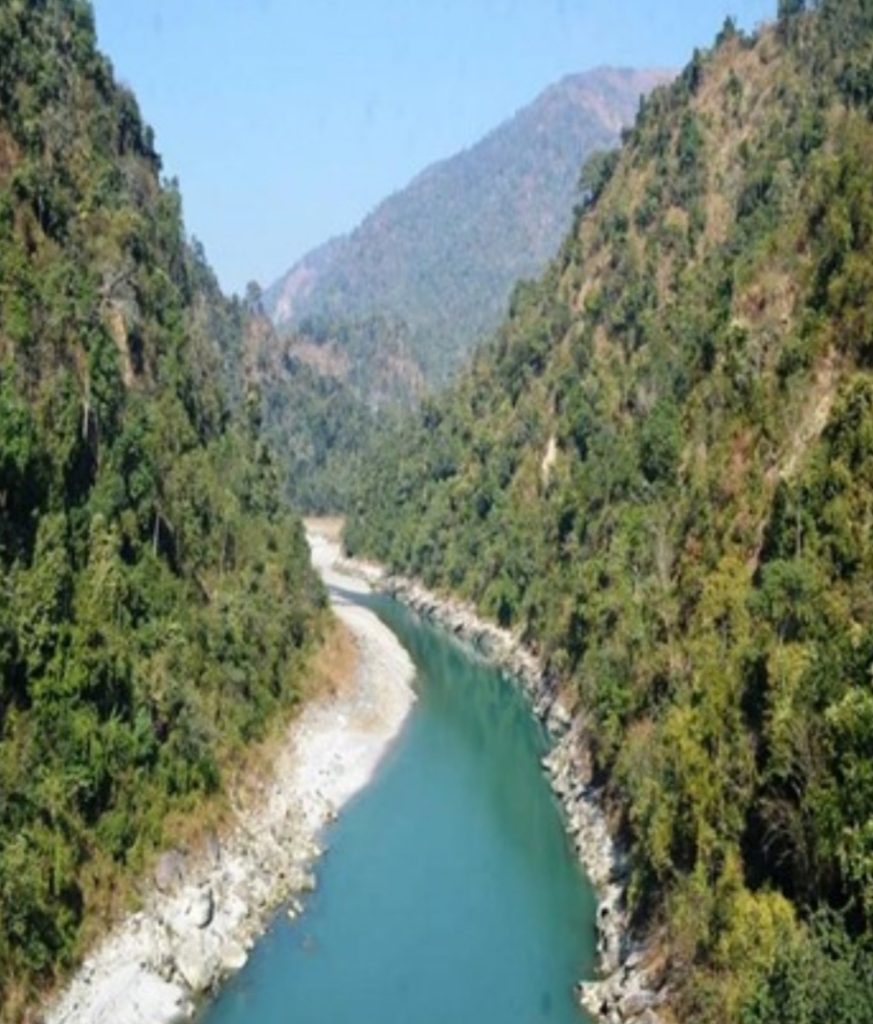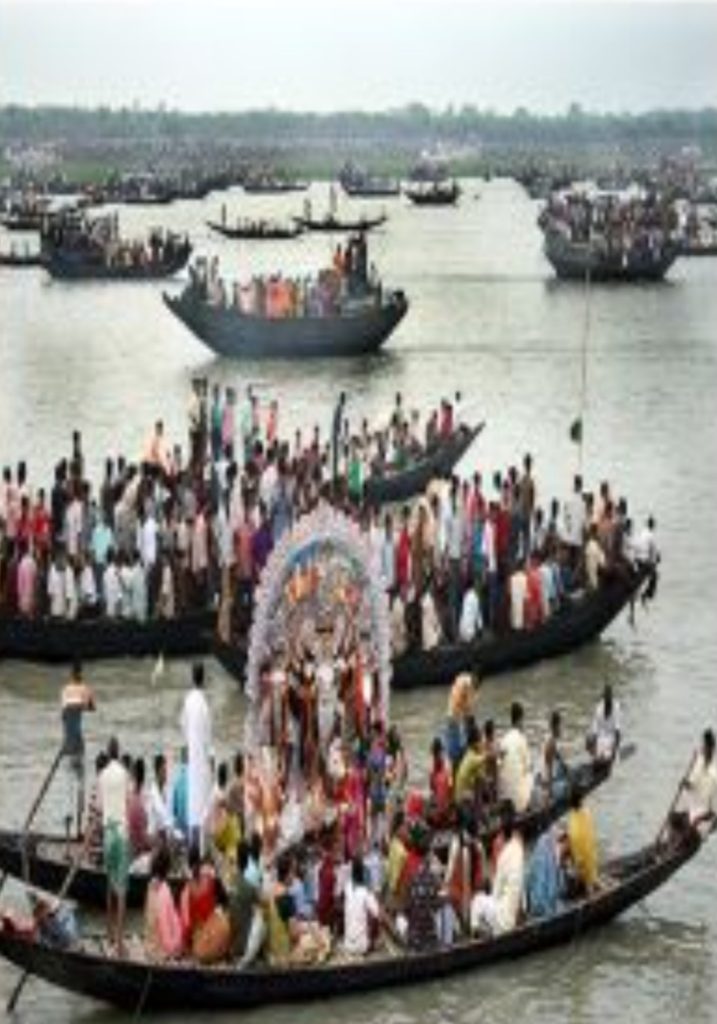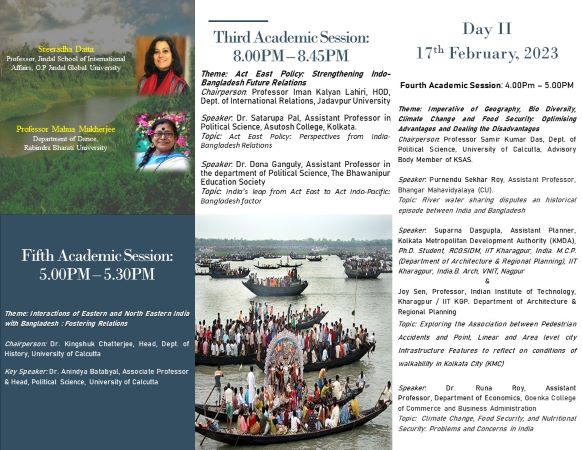23 February 2023
INTERNATIONAL WEBINAR (PART II)
A FIESTA OF FIFTY YEARS OF INDO-BANGLADESH RELATIONS
“Bangladesh’s rise as a developing economy is well documented. A nation transformed from an LDC to a developing country in a span of five decades is poised to march ahead with growing income, resources and political leadership,” says Dr. Prabir De, the renowned scholar and Professor at the Research and Information System for Developing Countries (RIS), New Delhi presenting the paper ‘Changing Economic Contours of Bangladesh’ at the International Webinar organised by Kolkata Society for Asian Studies on 16th and 17th February 2023.
Bangladesh has many remarkable success stories to highlight and now it seems to emerge as a role model in the world showcasing strong fundamentals in socio-economic aspects.
“Our economy achieved 6% plus average growth over the past decade until Pandemic and has regained growth spree marking 7.25% growth in FY2022 containing pandemic stress while many developed economies are seen underperforming backed by strong and resilient private sector and economic leadership. Bangladesh has been termed as the 5th top resilient economy globally due to quick pandemic recovery management and timely endeavour for global trading system revival. With the consistent performance in major economic indicators including foreign trade, Bangladesh has qualified and poised to graduate into a developing economy by 2026 followed by transformation into developed economy by 2041,” says Rizwan Rahman, famous financial expert and director, Eastland Insurance Company Ltd., and the Daily Financial Express. He also said that Bangladesh has been maintaining a steady and friendly trade relation with 180 countries in the global business world.
“China and India, the Asian economic powerhouse, are the major trading partners of Bangladesh since they together contribute 25% of our total trade,” he confirms the steady progress in their trade.
Shefalika Ghosh Samaddar, Professor, Department of Computer Science and Engineering, Dr. Sudhir Chandra Sur Institute of Technology and Sports Complex, Kolkata, West Bengal presented a paper on ‘Strengthening Indo-Bangladesh Trade and Business Cooperation through a Common Socio-Economic Tool: A Geographical Indications Perspective’.

“The Indo-Bangladesh bilateral relationship faced several hurdles in the pre-war and post-war era (before and after 1971). In the pre-war days it was influenced and battered by India-Pakistan relationship though there was an inherent cordial tie between the province of West Bengal and the then East Pakistan.
The neo Indo-Bangladesh bilateral relationship was laid way back in the post war days of 1971. The War of Liberation has been the mother of new-born relationships having age-old shared tradition and culture. The cultural expressions of the two countries are the same or similar. The trade of the goods and services is easier as there are commonalities in every aspect of life of the Nations. The commonalities boost connectivity leading to better trade relations and market creation. With advancement of technology, new areas of trade with exchange of expertise and manpower have been explored,” he analyzes in detail all trade relations, both bilateral and multilateral.The paper discusses the trade related controversies and solutions on goods and services having similar Geographical Indications of India and Bangladesh.
“Economic and strategic cooperation between two countries is an essential pre- requisite for trade and business cooperation. The cultural and educational ties between the countries are well-developed across the boundaries that are bound to succeed if governed by a sound legal framework of bilateral treaties with understanding,” he says.
Dr. Anjan Saha,West Bengal Education Service Assistant Professor, Department of History, Maulana Azad College, Kolkata talke on the subject-‘Indian involvement in Bangladesh Liberation War’71 : Humanitarian Intervention or Cold Calculation’.

Dr. Papri Chakraborty, Assistant Professor, Department of Political Science, University of GourBanga Malda, West Bengal, India analyses the security initiative with a perspective of the ‘Rohingya Refugees’, a wider subject and a cause of greater concern for the Indian government and to the international community.
“India and Bangladesh have shared culture, history and common heritage for a long time. In the year 2021, Bangladesh has been celebrated 50 years of her independence, maintaining also 50 years of diplomatic relation with India,” says Dr. Satarupa Pal,Assistant Professor in Political Science, Asutosh College, Kolkata presenting a paper on ‘Act East Policy: Perspectives from India- Bangladesh Relations’.
“Bangladesh was not only a key part of India’s ‘neighbourhood first policy” but also crucial for New Delhi’s “Act East Policy”, which tries to maintain ties between India and South-East Asia. Act East Policy has been emphasized on geo-political, sea-lives communication, trade-partnership, connectivity to North East states etc. Act East policy tries to maintain strategic and cultural relations with the vast Asia-Pacific region at different levels. Security is an important dimension of India’s Act East Policy. Act East Policy was announced in November 2014 is the upgrade of the Look East Policy. It aims to promote economic, in the geo-political perspective, Bangladesh is a natural pillar of Act East Policy, creating ‘bridge to economic and beyond. Bangladesh is an important component of BIMSTEC and BBIN initiatives. Combating terrorism, Bangladesh helps India to stop extremists activity. Concerning trade relations, Bangladesh and India both are the members of Asia Pacific Trade Agreement (APTA), SAARC Preferential Trade Agreement (SAPTA) and the Agreement on South Asian Free Trade Area (SAFTA) which govern the tariff regimes for trade.,” says Dr. Satarupa Pal.
Dr. Dona Ganguly, whohas specialised in India’s Foreign policy in South and Southeast Asia and authored many articles in various journals, now working as Assistant Professor in the department of Political Science, Bhawanipur Education Society College, presented the topic ‘India’s leap from Act East to Act Indo-Pacific: Bangladesh Factor’.
“The Government of India under the then Prime Minister P.V. Narasimha Rao launched India’s ‘Look East’ policy in 1991 in order to strengthen the diplomatic and economic relations with countries lying to the east of India, especially the ASEAN and other Southeast Asian countries. On taking over as the Prime Minister Narendra Modi rechristened the policy as ‘Act East’ policy in 2014 which is more focused on looking beyond Asia to include countries like Australia and New Zealand,”Dr. Dona Ganguly shares on the present geopolitical developments such as China’s BRI and the new initiatives of QUAD countries that turned Indo-Pacific a new theatre of world politics.
“One prestigious opportunity of my life worth mentioning was when I was invited by the University of Dhaka to be the Tagore Chair Visiting Professor, and under the Ministry of External Affairs. The Indian Council for Cultural Relations, Government of India had deputed me as an Academic Ambassador in DU in July 2016 and I served there for one year with great honour and actively participated in various activities like seminars, memorial lectures, special lectures, taking classes, writing various articles etc,” Prof. Mahua Mukherjee, Former Professor, Department of Dance, Rabindra Bharati University and former Dean of Arts Rabindra Bharati University shared her experiences on the topic, ‘Gaudiya Nritya: Bangladesh’ as she had been visiting Bangladesh since 1984, for many purposes-specially visits to Museums, excavation sites like Paharpur, Mahasthangarh etc for her research purpose on Gaudiya Nritya and also for programmes organized by famous singer Janab Faqir Alamgir of Wrishij Shilpi Gosthi, Shamim Ara Nipa, Shibli Mohammad and MD Jahangir of Nrityanchal.
“This webinar is a pro bono basis effort from a non- profit organization. We have not received any Government, private grant or sponsorship to organize this conference, but with our limited capacity we can successfully organize this webinar with the spontaneous support from the International and national level delegates and scholars,” says Dr. Sarmistha De Basu, Former post Doc. Fellow, ICSSR, Research Fellow, The Asiatic Society and the Secretary, Kolkata Society for Asian Studies.
“We have successfully completed the event with a message that in spite of some deficiency of effort to follow up various projects between the two nations, the common interest to build up a healthy friendly mutual collaboration between us is alive and it can be used by both the Governments to promote mutual negotiations to build up new business agendas, political treaties and cultural bonding,” says Dr. Sarmistha De Basu, the Convener and Coordinator of the International Webinar.


